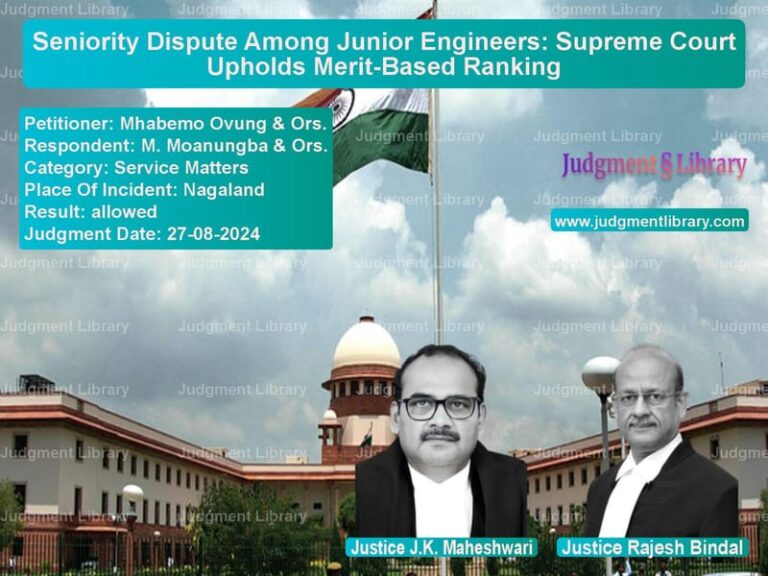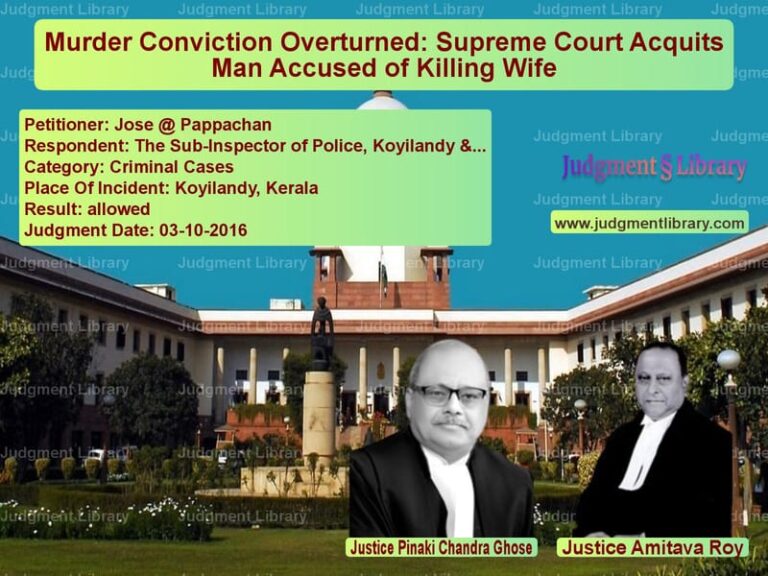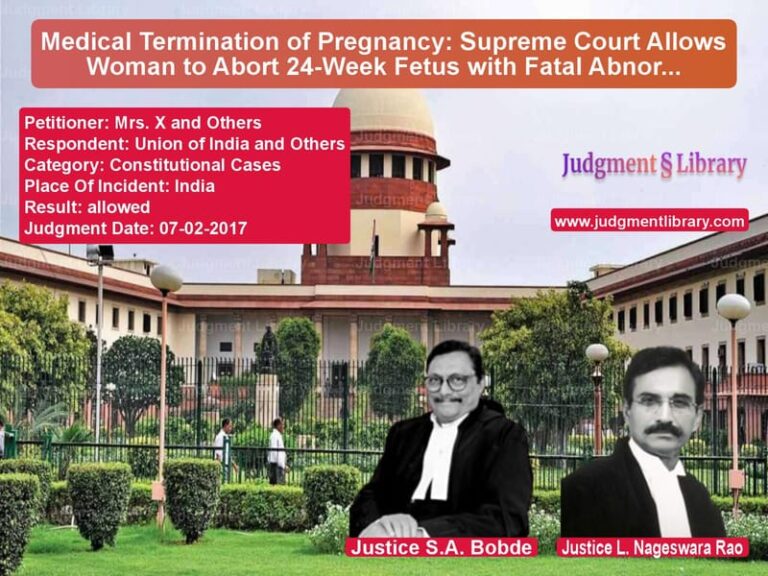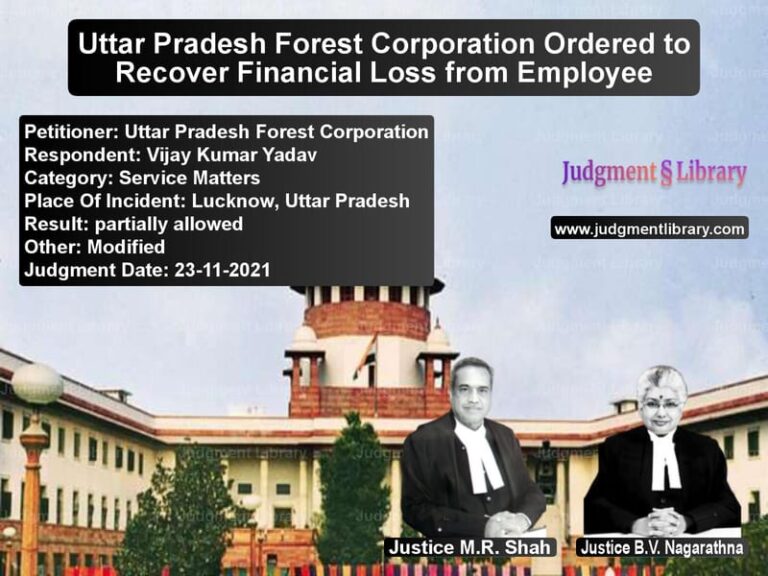Supreme Court Rules on Insolvency and Moratorium in Corporate Debt Case
The Supreme Court of India recently delivered a significant ruling in the case of Anand Rao Korada v. M/s. Varsha Fabrics (P) Ltd. & Others, addressing key legal issues surrounding corporate insolvency, moratorium under the Insolvency and Bankruptcy Code (IBC), and the jurisdiction of courts in such matters. The judgment highlights the primacy of IBC over parallel legal proceedings and the exclusive jurisdiction of the National Company Law Tribunal (NCLT) in insolvency matters.
Background of the Case
The case involved a dispute concerning M/s. Hirakud Industrial Works Ltd. (the ‘Corporate Debtor’), whose assets were under auction proceedings initiated by the Odisha High Court for payment of outstanding dues to workmen. Meanwhile, a Corporate Insolvency Resolution Process (CIRP) had commenced against the Corporate Debtor following a petition filed by a financial creditor before the NCLT, Cuttack Bench. The NCLT had declared a moratorium under Section 14 of the IBC, effectively putting a hold on all legal actions against the company.
Legal Proceedings
The case reached the Supreme Court when the Resolution Professional, Mr. Anand Rao Korada, challenged interim orders passed by the Odisha High Court directing auction proceedings of the Corporate Debtor’s assets. The Supreme Court was required to determine whether such proceedings could continue despite the moratorium declared under IBC.
Key Legal Issues
- Whether the Odisha High Court had the jurisdiction to proceed with the auction of assets despite the moratorium under IBC.
- Whether parallel proceedings in the High Court could override the exclusive jurisdiction of NCLT in insolvency matters.
- Whether workmen’s dues should be settled under the framework of IBC rather than through independent judicial proceedings.
Arguments by the Petitioner (Resolution Professional)
The Resolution Professional contended that:
- The declaration of a moratorium under Section 14 of the IBC prohibits all suits, legal proceedings, and enforcement actions against the Corporate Debtor.
- The NCLT is the sole authority with jurisdiction over matters concerning the insolvency resolution of corporate debtors.
- The auction proceedings directed by the High Court would interfere with the CIRP and the orderly distribution of assets as per IBC regulations.
Arguments by the Respondents
The respondents, including workmen’s representatives, argued that:
- The auction was necessary to secure outstanding dues for workmen who had been waiting for their payments.
- The High Court had previously directed the auction, and workmen’s rights should not be compromised under IBC.
- The moratorium should not prevent courts from ensuring justice for workmen affected by corporate insolvency.
Supreme Court’s Ruling
The Supreme Court, in a judgment authored by Justices Indu Malhotra and R. Subhash Reddy, ruled in favor of the Resolution Professional and made several key observations:
- The IBC is a complete code governing insolvency resolution, and it has an overriding effect on other laws under Section 238 of the Code.
- The moratorium imposed by the NCLT under Section 14 prohibits any parallel proceedings, including execution of judgments and sale of assets.
- The High Court had no jurisdiction to direct auction proceedings once the moratorium was in place.
- Workmen’s dues should be claimed through the insolvency process by filing claims under Regulation 9 of the IBBI (Insolvency Resolution Process for Corporate Persons) Regulations, 2016.
Impact of the Judgment
This ruling strengthens the position of the IBC in regulating corporate insolvency. It clarifies that once insolvency proceedings commence, all stakeholders, including workmen, financial creditors, and operational creditors, must seek redress within the IBC framework rather than through parallel legal proceedings.
The decision also underscores the importance of adhering to the structured insolvency resolution process, ensuring an equitable and systematic distribution of assets.
Conclusion
The Supreme Court’s judgment in Anand Rao Korada v. M/s. Varsha Fabrics (P) Ltd. reaffirms the primacy of IBC in corporate insolvency matters. By setting aside the High Court’s orders, the Court has ensured that the insolvency resolution process remains undisturbed, preventing multiple legal proceedings from disrupting the structured framework provided by IBC. This decision will serve as a precedent in ensuring that insolvency laws are implemented uniformly and effectively across all cases.
Petitioner Name: Anand Rao Korada.Respondent Name: M/s. Varsha Fabrics (P) Ltd. & Others.Judgment By: Justice Indu Malhotra, Justice R. Subhash Reddy.Place Of Incident: Odisha.Judgment Date: 18-11-2019.
Don’t miss out on the full details! Download the complete judgment in PDF format below and gain valuable insights instantly!
Download Judgment: Anand Rao Korada vs Ms. Varsha Fabrics Supreme Court of India Judgment Dated 18-11-2019.pdf
Direct Downlaod Judgment: Direct downlaod this Judgment
See all petitions in Bankruptcy and Insolvency
See all petitions in Corporate Compliance
See all petitions in Company Law
See all petitions in Judgment by Indu Malhotra
See all petitions in Judgment by R. Subhash Reddy
See all petitions in allowed
See all petitions in Quashed
See all petitions in supreme court of India judgments November 2019
See all petitions in 2019 judgments
See all posts in Corporate and Commercial Cases Category
See all allowed petitions in Corporate and Commercial Cases Category
See all Dismissed petitions in Corporate and Commercial Cases Category
See all partially allowed petitions in Corporate and Commercial Cases Category







